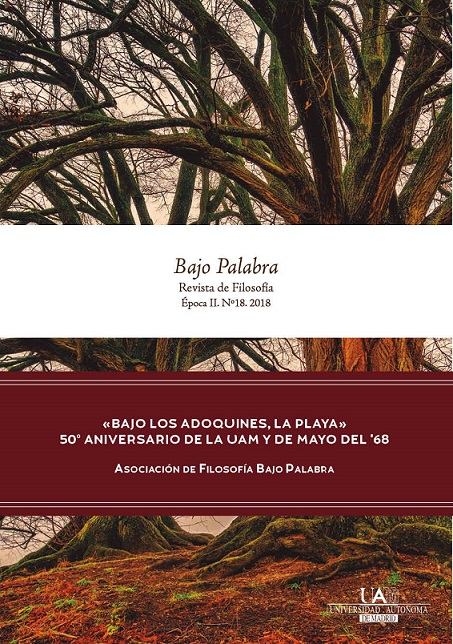Brevísimo análisis doxográfico sobre el Constructivismo: de los presocráticos a la cibernética de segundo orden // A (Very) Brief Doxographical Analysis of Constructivism: from Pre-Socratics to Second-Order Cybernetics
Résumé
Resumen
El constructivismo es una corriente filosófica con una fuerte presencia en la epistemología contemporánea. Esta escuela de pensamiento suscribe la tesis de que el conocimiento se construye activamente por el sujeto cognoscente y responde a una forma de situarse frente a la experiencia, siendo esta la última realidad efectivamente accesible. Este trabajo traza una breve curva interdisciplinar que comprende algunas de las más importantes posturas filosóficas que contribuyeron a la consolidación de esta escuela de pensamiento durante más de veinticinco siglos.
Palabras clave: constructivismo, cibernética, epistemología, historia de la filosofía,
percepción, realidad.
Téléchargements
Références
Brunswick, Egon, “Ratiomorphic models of perception and thinking”, Acta Psychologica, 11, 1955, pp. 108-109.
Descartes, René, Meditations on First Philosophy, Cambridge, Cambridge University Press, 1996, p. 19. https://doi.org/10.1017/CBO9780511805028
Ensor, George, A Review of the Miracles, Prophecies, & Mysteries of the Old and New Testaments and of the Morality and Consolation of the Christian Religion, London, John Brooks, 1835, p. 85.
Foerster, Heinz von, Understanding Understanding: Essays on Cybernetics and Cognition, New York, Springer-Verlag, 2003, p. 289.
Glasersfeld, Ernest von, “Introduction to Radical Constructivism”, The Invented Reality, New York, Norton Press, 1984, p. 18.
Glasersfeld, Ernest von, Radical Constructivism: A Way of Knowing and Learning, London, Routledge Falmer, 1995, p. 50.
Hume, David, A Treatise of Human Nature, Oxford, Clarendon Press, 1888, p. 252.
Kant, Immanuel, Critique of Pure Reason, Cambridge, Cambridge University Press, 1998, pp. 137-138. https://doi.org/10.1017/CBO9780511804649
Locke, John, An Essay Concerning Human Understanding, London, T. Tegg and Son, 1836, pp. 171-172.
Locke, John, The Works of John Locke, vol. 9, 11th ed., London, Harvard College Library, 1812, p. 217.
Lorenz, Konrad, “Kant’s Doctrine of the A Priori in the Light of Contemporary Biology”, Philosophy after Darwin: Classic and Contemporary Readings, New Jersey, Princeton University Press, 2009, pp. 231-247.
Malebranche, Nicolas, The Search after Truth, Cambridge, Cambridge University Press, 1997, p. 234.
Malebranche, Nicolas, Conversations chrétiennes: Méditations sur l´humilité, Paris, Vrin, 2010, p. 153.
Sextus Empiricus, Outlines of Pyrrhonism, Oxford, Oxford University Press, 1996, pp. 18-19.
Uexküll, Jakob von, A Foray into the Worlds of Animals and Humans: With a Theory of Meaning, Minneapolis, University of Minnesota Press, 2010, p. 50.
Vico, Giambattista, On the Most Ancient Wisdom of the Italians, Ithaca, Cornell University Press, 1988, pp. 93-94.
